新目标人教版七年级下册一般过去时
- 格式:ppt
- 大小:96.50 KB
- 文档页数:15

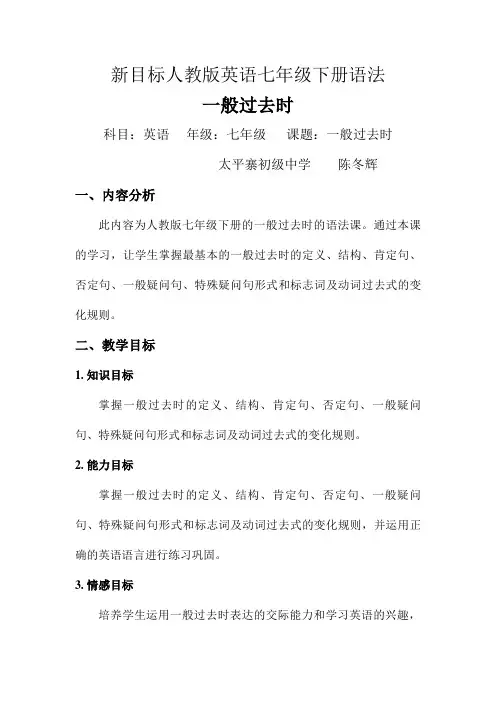
新目标人教版英语七年级下册语法一般过去时科目:英语年级:七年级课题:一般过去时太平寨初级中学陈冬辉一、内容分析此内容为人教版七年级下册的一般过去时的语法课。
通过本课的学习,让学生掌握最基本的一般过去时的定义、结构、肯定句、否定句、一般疑问句、特殊疑问句形式和标志词及动词过去式的变化规则。
二、教学目标1. 知识目标掌握一般过去时的定义、结构、肯定句、否定句、一般疑问句、特殊疑问句形式和标志词及动词过去式的变化规则。
2. 能力目标掌握一般过去时的定义、结构、肯定句、否定句、一般疑问句、特殊疑问句形式和标志词及动词过去式的变化规则,并运用正确的英语语言进行练习巩固。
3. 情感目标培养学生运用一般过去时表达的交际能力和学习英语的兴趣,提高他们学习英语的主动性和积极性。
三、教学重点和难点重点:一般过去时及规则动词过去式的构成。
难点:不规则动词过去式的变化。
四、授课类型:新授课五、教学资源:课件六、教学过程(一)学习目标一般过去时(二)精彩导入让学生听歌曲《Yesterday Once More》中截取部分,When I was young. I'd listen to the radio. Waiting for my favorite songs. When they played I'd sing along. It make me smile. Those were such happy times and not so long ago.引出一般过去时。
(三)新授过程1、由歌曲中的句子I was young/they played/Those were suchhappy time总结一般过去时的概念。
一般过去时表示过去某个时间或某一段时间内发生的动作或存在的状态。
For exampleShe was at home yesterday.They were students one year ago.They worked in Beijing last year.2、继续观察上面的句子,总结一般过去时常用的时间状语。
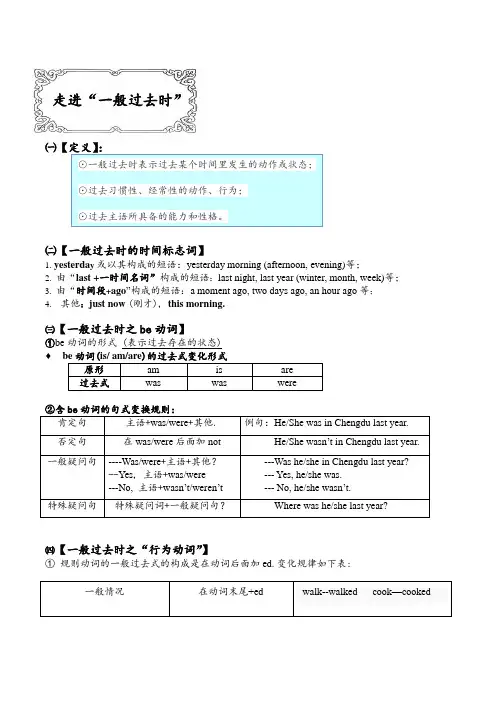
走进“一般过去时”㈠【定义】:㈡【一般过去时的时间标志词】1. yesterda y 或以其构成的短语:yesterday morning (afternoon, evening)等;2. 由“last +一时间名词”构成的短语:last night, last year (winter, month, week)等;3. 由“时间段+ago ”构成的短语:a moment ago, two days ago, an hour ago 等;4. 其他:just now (刚才), this morning.㈢【一般过去时之be 动词】①be 动词的形式 (表示过去存在的状态) be 动词(is/ am/are )的过去式变化形式原形 am is are过去式 was waswere②含be 动词的句式变换规则: 肯定句 主语+was/were +其他. 例句:He/She was in Chengdu last year.否定句在was/were 后面加notHe/She wasn ’t in Chengdu last year. 一般疑问句 ----Was/were +主语+其他?--Yes , 主语+was/were ---No, 主语+wasn ’t/weren ’t ---Was he/she in Chengdu last year? --- Yes, he/she was. --- No, he/she wasn ’t. 特殊疑问句特殊疑问词+一般疑问句?Where was he/she last year?㈣【一般过去时之“行为动词”】① 规则动词的一般过去式的构成是在动词后面加ed .变化规律如下表:一般情况在动词末尾+edwalk--walked cook —cooked⊙一般过去时表示过去某个时间里发生的动作或状态;⊙过去习惯性、经常性的动作、行为;⊙过去主语所具备的能力和性格。

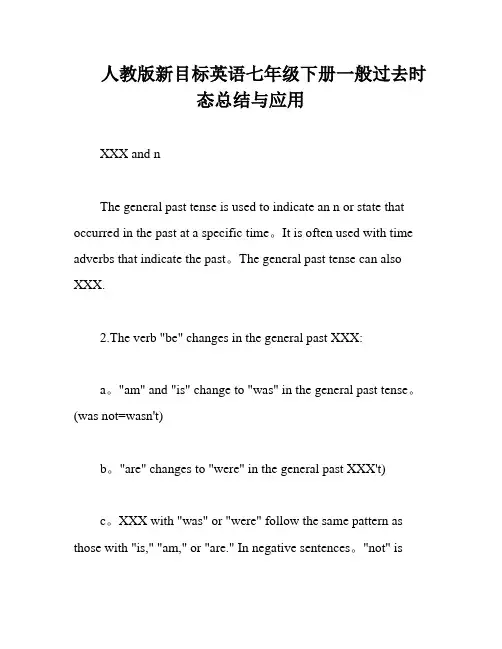
人教版新目标英语七年级下册一般过去时态总结与应用XXX and nThe general past tense is used to indicate an n or state that occurred in the past at a specific time。
It is often used with time adverbs that indicate the past。
The general past tense can also XXX.2.The verb "be" changes in the general past XXX:a。
"am" and "is" change to "was" in the general past tense。
(was not=wasn't)b。
"are" changes to "were" in the general past XXX't)c。
XXX with "was" or "were" follow the same pattern as those with "is," "am," or "are." In negative sentences。
"not" isadded after "was" or "were." In interrogative sentences。
"was" or "were" is moved to the beginning of the sentence.3.XXX without the verb "be" in the general past XXX:a。

初识一般过去时一、一般过去时态的概念及构造一般过去时主要表示过去发生的动作或存在的状态。
在句子中由主语+ 动词的过去式来表达。
如:(1) He walks to school. 〔一般现在时〕(2) He walked to school. 〔一般过去时〕句子(1)中动词walks是现在式〔即第三人称单数〕。
由于主语是第三人称单数的he,所以原形的walk后必须加上-s表示习惯性的、经常性的动作。
句意为:他经常步行上学。
而在句子(2)中,动词walked是过去式,过去式是表达过去事情的动词形式,因此这个句子是表示过去的某时,句意为:他曾经步行上学。
be动词的一般过去时:肯定句:主语+ be动词的过去式was / were +其他.否认句:主语+ be动词的过去式was / were + not +其他.疑问句:be动词的过去式Was / Were + 主语+ 其他?如:He was busy yesterday. 他昨天很忙。
〔肯定句〕He was not (wasn’t) busy yesterday. 他昨天不忙。
〔否认句〕Was he busy yesterday? 他昨天忙吗?〔一般疑问句〕行为动词的一般过去时:肯定句:主语+ 动词过去式+ 其他.否认句:主语+ 助动词did not / didn’t + 动词原形+ 其他.疑问句:助动词Did + 主语+ 动词原形+ 其他?注意:did是do的过去式,在这里是助动词,用来构成否认句和一般疑问句,与一般现在时中的do / does功能一样。
如:He played football last Sunday. 他上个星期天踢足球了。
〔肯定句〕He did not play football last Sunday. 他上个星期天没有踢足球。
〔否认句〕Did he play football last Sunday? 上个星期天他踢足球了吗?〔一般疑问句〕注意:行为动词的过去式没有人称和数的变化。
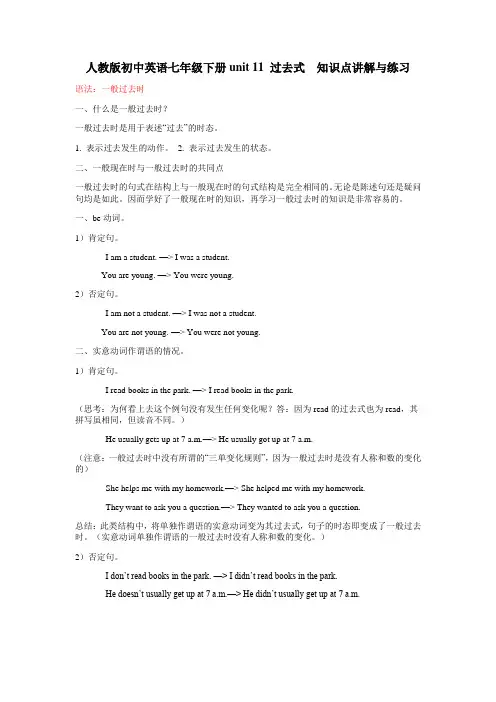
人教版初中英语七年级下册unit 11 过去式知识点讲解与练习语法:一般过去时一、什么是一般过去时?一般过去时是用于表述“过去”的时态。
1. 表示过去发生的动作。
2. 表示过去发生的状态。
二、一般现在时与一般过去时的共同点一般过去时的句式在结构上与一般现在时的句式结构是完全相同的。
无论是陈述句还是疑问句均是如此。
因而学好了一般现在时的知识,再学习一般过去时的知识是非常容易的。
一、be动词。
1)肯定句。
I am a student. —> I was a student.You are young. —> You were young.2)否定句。
I am not a student. —> I was not a student.You are not young. —> You were not young.二、实意动词作谓语的情况。
1)肯定句。
I read books in the park. —> I read books in the park.(思考:为何看上去这个例句没有发生任何变化呢?答:因为read的过去式也为read,其拼写虽相同,但读音不同。
)He usually gets up at 7 a.m.—> He usually got up at 7 a.m.(注意:一般过去时中没有所谓的“三单变化规则”,因为一般过去时是没有人称和数的变化的)She helps me with my homework.—> She helped me with my homework.They want to ask you a question.—> They wanted to ask you a question.总结:此类结构中,将单独作谓语的实意动词变为其过去式,句子的时态即变成了一般过去时。
(实意动词单独作谓语的一般过去时没有人称和数的变化。


名词单复数,一般现在时,一般过去时,现在进行时姓名:________名词单复数:名词变复数规则变化及发音:1、绝大多数的可数名词在词尾加上s :book→books;→ desks;pen→pens;car→cars s 遇t读浊辅音[ts],遇d读清辅音[dz]friend→friends; cat→cats; 2.、以s、x、ch、sh结尾的单词,在该词末尾加上-es;读音规则:读[iz];bus→buses; box→boxes; → watchches; dish→dishes 3、以辅音字母+y结尾的名词,要把y变为i,再加-es;读音规则:读[z]。
fly→flies; baby→b abies; 元音字母加y结尾的单词直接加s;toy →toys;boy→boys;4、以-f或-fe结尾的名词,要将-f或-fe变为-v,再加es;读音规则:读[vz];knife→knives;leaf→leaves;5、以-o结尾的名词,有三个单词要加-es,其余都加-s;读音规则:读[z]。
tomato→tomatoes西红柿; potato→potatoes土豆; hero→heroes 英雄; — Negroes 口诀:“黑人英雄喜欢吃土豆和西红柿”其余zoo→zoos; 名词变复数不规则变化:1.单词内部发生变化:口诀“oo常常变ee,男人女人a变e”foot→feet脚;tooth→teeth牙齿;man→men男人;woman→women女人;2.单复数相同:“羊小鹿无变化,单数复数是一家”sheep→sheep绵羊;fish→fish鱼;deer→deer鹿;3.不规则变化:child→children孩子;mouse→mice老鼠;German→Germans德国人;“某国人”的复数有三种类型:(1)Chinese, Japanese单数复数同形,不需加s;(2)Englishman, Frenchman, Dutchman复数要把 man 变为men;(3)其他各国人以–an, -ian收尾的均直接加s。

一般过去时【Key points】一般过去时——构成主语+动词过去式+其他一般过去时——用法1.过去存在的状态或发生的动作2.过去经常、反复发生的动作一般过去时——标志词day 系列:last 系列:ago 系列:一般过去时——上下文语境【Exercise】一、填空。
1.I (be) at school just now.2.He (enjoy) himself in the party last Sunday.3.My mother (clean) our house yesterday morning.4.—I (go) fishing on the weekend. What did you do?—I (clean) my room and (go) shopping.二、单选。
1.—I something wrong just now. May I use your eraser?—Yes. Here you are.A.writeB. wroteC. am writing2.My sister often lunch at school last year.A.hasB. haveC. havingD. had3.He always me with English when I was here.A.helpsB. helpingC. helped4.—I read a story about the singer.—Who it?A.writesB. wroteC. is writingD. is going to write5.—How was your weekend on the farm?—Great! We with the farmers.A.enjoy ourselvesB. make friendsC. are workingD. went fishing6.There some exciting news in yesterday’s newspaper.A.i sB. wasC. areD. were一般过去时——句式变换①含有 be 动词,直接用 be 进行变换Lucy was a volleyball player.否定:Lucy was not a volleyball player.一般疑问:—Was Lucy a volleyball player?—Yes, she was. / No, she wasn’t.特殊疑问:What was Lucy’s job?②含有实义动词,借用助动词 did 进行变换Tom worked in Beijing.否定:Tom didn’t work in Beijing.一般疑问句:—Did Tom work in Beijing?—Yes, he did. / No, he didn’t.特殊疑问句:Where did Tom worked?【Exercise】一、句式变换。
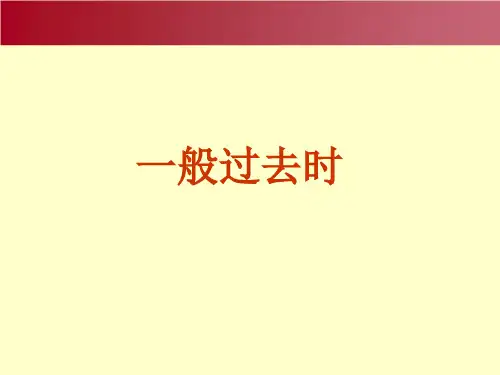
人教版新目标七年级英语下册 Unit 3 教学设计一. 教材分析人教版新目标七年级英语下册Unit 3主要围绕着日常生活中的活动展开,包括起床、吃早餐、上学等。
本节课的主要话题是描述日常活动的时间,学会用一般现在时来描述规律性的动作,用一般过去时来描述过去发生的事情。
教材通过丰富的图片、对话和练习,帮助学生掌握日常英语口语交流的能力,同时培养学生的观察力、思维力和创造力。
二. 学情分析七年级的学生已经掌握了基本的英语语音、词汇和语法知识,具备一定的英语听说读写能力。
但部分学生对英语学习仍存在恐惧心理,缺乏自信心。
针对这一情况,教师应关注学生的个体差异,鼓励他们大胆开口说英语,并在课堂上给予及时的反馈和鼓励。
三. 教学目标1.知识目标:–学会描述日常活动的时间。
–掌握一般现在时和一般过去时的基本用法。
–增加相关词汇:wake up, get up, have breakfast, go to school 等。
2.能力目标:–能够用英语简单描述自己的日常活动。
–提高学生的英语听说能力和团队协作能力。
3.情感目标:–激发学生学习英语的兴趣,培养积极的学习态度。
–增强学生之间的友谊,培养团队精神。
四. 教学重难点•描述日常活动的时间。
•运用一般现在时和一般过去时进行口语交流。
•正确运用一般现在时和一般过去时描述自己的日常活动。
•学会在适当的情境下使用一般现在时和一般过去时。
五. 教学方法1.情境教学法:通过设定生活情境,让学生在实际语境中学习、运用英语。
2.任务型教学法:引导学生参与各种小组活动,提高学生的团队协作能力和口语表达能力。
3.激励评价法:及时给予学生反馈,关注学生的点滴进步,激发学生的学习兴趣。
六. 教学准备1.教学素材:教材、多媒体课件、录音机、磁带、相关图片等。
2.教学工具:黑板、粉笔、投影仪等。
七. 教学过程1.导入(5分钟)–教师与学生用英语进行自由谈话,引导学生谈论日常活动。
–提问:What time do you get up? What do you have for breakfast? 让学生用英语回答。
一般现在,现在进行,一般过去三大时态辨析与练习导学案一.一般现在时态用法:1. 表示经常发生的动作或存在的状态2. 陈述客观事实,真理2.动词的形式英语中所说的时态体现在____________上Be动词在一般现在时态中有____种形式分别是_______________一般现在时态的句子,当我们在完成_________和___________句时我们需要助动词帮忙他们是______ _______ 一般现在时态中,实意动词的形式有______种分别是___________play_____ like ______ study _______ see______ say________3.一般现在时态常用的频率副词和时间状语_________________________________________________________________肯定句:She is of medium height. 变成一般疑问句:___________________________? 肯定回答:否定句:_____________________. 否定回答:肯定句:Lily plays the violin every week. 变为一般疑问句:________________________? 肯定回答:否定句:______________________. 否定回答:二.现在进行时态用法:1.表示现在正在进行的动作或现阶段在进行的动作2.一些特定的动词的进行时态也可以表示将来如arrive,come,leave等动词形式:现在进行时态中,谓语动词的结构是__________________写出这些动词的ing形式:play_______ buy_______ have______ make_______ dance_______exercise__________ swim_______ stop_______ shop_____ get_________3.现在进行时态的时间状语及提示词:________________________________________________肯定句:我正在做我的家庭作业____________________________________.否定句:_________________________.一般疑问句:_______________________? 肯定回答:_________________ 否定回答:______________看!我爸爸正在给奶牛挤奶。
人教新目标版英语七下Unit 11《How was your school trip》(Section A 1a)教学设计一. 教材分析人教新目标版英语七下Unit 11《How was your school trip》主要介绍了关于学校旅行的相关话题。
通过本节课的学习,学生能够掌握一般过去时的疑问句和回答,以及描述过去事件的词汇和短语。
本节课的主要内容包括旅行前的准备、旅行中的活动以及旅行后的感受。
教材内容丰富,插图生动,有助于激发学生的学习兴趣。
二. 学情分析七年级的学生已经掌握了基本的英语语法知识,能够运用一般现在时进行交流。
但是,对于一般过去时的疑问句和回答,学生可能还不太熟悉。
因此,在教学过程中,需要加强对一般过去时的讲解和练习。
此外,学生对于描述过去事件的词汇和短语可能还不够熟练,需要通过大量的例子和练习来加以巩固。
三. 教学目标1.能够正确使用一般过去时进行疑问句和回答。
2.能够运用本节课学到的词汇和短语描述过去的事件。
3.能够听懂、会说、会写本节课的主要内容。
4.能够提高自己的合作能力和表达能力。
四. 教学重难点1.一般过去时的疑问句和回答。
2.描述过去事件的词汇和短语。
五. 教学方法采用任务型教学法,通过各种互动活动,让学生在实践中学习和掌握知识。
同时,运用情境教学法,创设真实的情景,使学生在具体的情境中学习英语。
此外,还采用分组合作学习的方式,培养学生的团队精神和沟通能力。
六. 教学准备1.教材、课件和教学资源。
2.录音机、磁带或音频文件。
3.教学卡片、图片等。
七. 教学过程1.导入(5分钟)通过展示一张美丽的旅行图片,引导学生谈论自己最喜欢的旅行。
同时,询问学生是否曾经去过某个地方,引导学生思考一般过去时的用法。
2.呈现(10分钟)展示本节课的主要内容,包括旅行前的准备、旅行中的活动以及旅行后的感受。
通过图片、卡片等形式,呈现本节课的重点词汇和短语。
3.操练(15分钟)采用分组合作的方式,让学生进行角色扮演,模拟旅行中的各种情景。
人教版新目标英语七年级下册全册教案Unit 1 Will people have robots ?Teaching goals:1.Words&phrases: robot, paper, less, fewer, simple, unpleasant,factory, seem, etc .2.will 构成的一般将来时态的陈述句、否定句、疑问句及回答.3.There be 句型的一般将来时.4.more , less , fewer 的用法.5.学习一般将来时态的相关知识,学会对未来进行预测.6.对five years ago ,today ,in five years 简洁回顾与展望的方式,贴近实际符合学生心理,激发学习兴趣.7.通过时间对比复习一般过去时态、一般现在时态,巩固一般将来时.Important and difficult points :1.will构成一般将来时态的句式。
2.There be 句型的一般将来时态。
3.more , fewer , less 的用法。
4.How to make predictions .Period 1Teaching procedures:Step 1 Leading in1.Greetings: Welcome to school .What’s the date today ? Who’s on duty today ?Do you enjoy your winter holiday ?Do you finish your homework ?Do you want to live on the moon ?Can you guess what will happen in ten years ?Collect the Ss’ answers an d say something about their predictions . Step 2 Pre-taskSB Page 2 ,1a .1.Look at the picture :How will the world be different in thefuture ,100 years from now ?We’re going to talk about sth in 100 years .2.Read each predictions to the class .Explain the new vocabulary .3.Read the instructions .Make sure Ss know what they should do .4.Do it by themselves .5.Talk about the answers with the class .Explain :一般将来时态构成: will / be going to +动词原形Step 3 While-taskSB Page 2 ,1b .1.Practise reading the six predictions .2.Read the instructions to Ss .Circle the things you hear on therecording .3.Play the tape twice .4.Play the tape a third time .At the same time ,check the answers . SB Page 2 , 1c .1.Pay attention to the dialogues .2.Read the dialogues fluently .3.Pairwork .Work in pairs to make predictions according to thesample .4.Ask several pairs to share their conversations to the class .SB Page 3 , 2a & 2b .1.Read the predictions .2.Read the instructions and point out the sample answer .3.Play the tape twice .Ss circle the word they hear in each sentences:more , less , fewer .4.Check the answers .学生探究: less , fewer 的区别。
一般现在时、现在进行时与一般过去时的比较我们在学习英语时,经常要提到一般现在时、现在进行时和一般过去时等,它们都是指谓语动词的时态。
什么是时态呢?在英语中,表示不同时间发生的动作或存在的状态,需用不同的动词形式,这种不同的动词形式称为时态。
我们也可以简单地理解为:“时”就是谓语动词所发生的时间,“态”就是谓语动词所用的形态。
在汉语中不管动作是什么时候发生的,动词形式基本上没有什么变化,例如:1、我经常打篮球。
2、我正在打篮球。
3、我昨天下午打篮球。
在这三句话中,虽然动作发生的时间不相同,但用的是相同的动词“打”。
他们对应的英语却是:1、I often play basketball. 2、I am playing basketball now. 3、I played basketball yesterday afternoon.在这三句话中,虽然动作都是“打”,但这些动作发生的时间不同,第一句说的是经常的或习惯性的动作,属于一般现在时,所以谓语动词用原形play,第二句说的是现在正在进行的动作,属于现在进行时,所以谓语动词用助动词am和现在分词playing.第三句说的动作是发生在昨天下午,属于一般过去时,所以谓语动词用过去时形式played.因此,当我们用英语说每一句话的时候,我们首先要考虑时态问题,谓语动词要用适当的时态形式。
一、三种时态所表示的意义不同:1、一般现在时表示现在的状态。
如:She is at home. 她现在在家。
一般现在时也表示经常的或习惯性的动作。
如:He often plays basketball.他时常打篮球。
2、现在进行时表示现在进行时表示现在(说话瞬间)正在进行或发生的动作。
如:He is playing basketball now.他正在打篮球。
3、一般过去时表示表示过去某个时间存在的状态。
如:She was at home yesterday.她昨天在家。